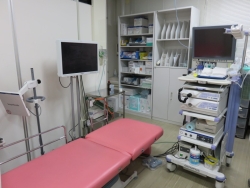
Over the five years from 2009 to 2013, the Esophageal Surgery Department undertook 27 cases of esophageal surgery, the majority of which were esophageal cancer. Most of these esophageal cancer surgical cases tend to exhibit a wide range of invasion, which spreads to the threes area of the neck, chest and abdomen. Besides surgery, there are other non-excision options such as radiation therapy or chemotherapy. We carefully weigh the benefits of each treatment method based on the condition of each individual patient before deciding if surgical excision should be used, and closely cooperate with other departments such as Internal Medicine and Radiology department to provide coordinated treatments. In addition to standard reconstructive surgery, in 2010 we have also adopted thoracoscopic and laparoscopic reconstructive surgery procedures which are capable of minimally-invasive treatment of stage 0 and stage 1 cancers. This procedure offers the benefits of quick post-operative recovery, minimal scarring, and effective results.